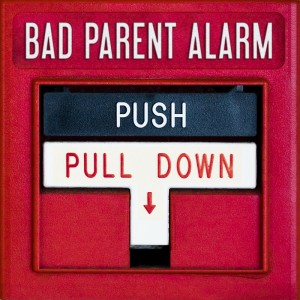A dear friend hated the post I wrote yesterday on how we’re all lousy parents. He found something in every paragraph to disagree with and found the opening particularly offensive.
He told me: “Not all of us were raised by lousy parents. Not all of us ARE lousy parents. No matter how one was raised at a certain point your life becomes your own responsibility. Not your parents. Not your genes. Not your phobias. This post, to me, is escapism and blame. I choose to fix the problem and not the blame.”
Those sentiments were not what I was going for, so let’s clarify a few things.
Let’s start with the opening:
I’ve had conversations with other parents recently that highlight a fear we all share: Despite our best efforts, we’ll scar our children anyway.
I’m thinking my friend took this as me saying all parents suck, period. Not true. I was saying that among those parents I’ve had the conversation with, all of us share the fear of damaging our kids. That doesn’t mean we will. It’s simply something we worry about. He took the title in the fullest literal sense, which is unfortunate because I was being partly facetious. Since those of us who had the conversation are convinced we are imperfect parents, I was lightheartedly saying, “OK, but let’s try not to suck too much.”
The escapism and blame he frowned upon comes from this passage, I assume:
My father could be a brutal teaser and taskmaster when it came to things like yard work and working in the family warehouse. It always seemed like my best was never good enough. Even as a grownup, I would tell him about promotions and raises at work, and when I told him what I was earning, he’d deliver these stinging words: “That’s it?” Dad also doesn’t have a verbal filter. If you put on weight, he’ll look at you, smile, and tell you you’re getting fat. Yet here I am, teasing my kids all the time.
If I had stopped there, it would have been about blame. But I continued:
Like most moms and dads, I always swore I’d do better than my parents did. But the older I get, the more I realize I haven’t been entirely fair to my mom and dad. They made their share of mistakes, but they did a lot right, too. With the help of excellent doctors, they kept me from dying of childhood illnesses. They got me through school and made my college education possible. My father has helped me out of more than a few financial jams. Yeah, bad things happened when I was a kid, but they were often things beyond my parents’ control. They tried to keep my older brother healthy, but he died anyway. They tried to keep their marriage together, but it wasn’t meant to be.
The point is that I blamed them for a lot of things earlier on, but being an imperfect parent has made me realize they didn’t deserve my scorn. My own challenges have given me a better understanding of what they did right despite all bad cards they were dealt along the way. Bitterness and blame were long ago replaced by forgiveness and gratitude. True, my relationship with Mom and Dad could be better today, but I attribute that more to the differences we struggle with together as adults.
My friend ended his comment with this: “I choose to fix the problem and not the blame.”
So do I.
As imperfect as I am, my boys are growing up with love and encouragement. I’m a constant presence in their lives, and when I see myself screwing up, I work to correct it. I’m also as honest as I can be with my children. If I’m in the wrong, I acknowledge it. And every day I tell them I’m proud of them, no matter how badly they’ve tested my patience. That’s progress.
I point out the lousy parts of my parenting because in acknowledging it, I can improve. And in sharing, my hope is that other parents can do the same.


